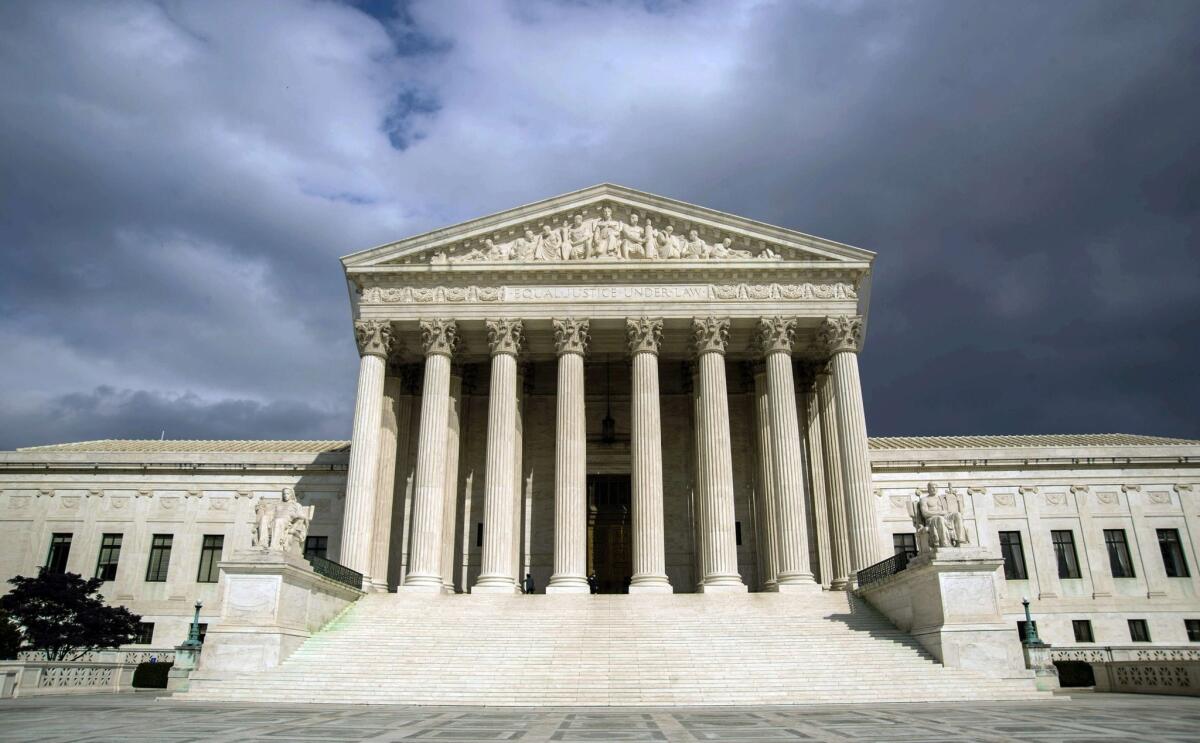Supreme Court upholds decision barring graduation in church

reporting from WASHINGTON — The Supreme Court gave supporters of church-state separation a rare and surprising victory Monday, leaving intact a lower-court decision that barred a public school district in Wisconsin from holding its graduation ceremonies in an evangelical Christian church.
Just last month, the court cleared the way for a larger public role for religion when it upheld a town council’s practice of opening its monthly meetings with Christian prayers delivered by a cleric.
Though some residents may be offended by prayers invoking Christ’s name, “adults often encounter speech they find disagreeable,” Justice Anthony M. Kennedy said in that case, speaking for a 5-4 majority. Adults are always free to stand up and leave the room, he added.
But Kennedy has taken a decidedly different view of prayers and religious invocations at public schools. In those cases, he has noted, students are a captive audience and are not free to leave.
The current case, involving graduation ceremonies for the Elmbrook School District in a western suburb of Milwaukee, posed a test of whether the court would relax its strict separation rule for public schools.
Because the school gym was hot, cramped and stuffy, the school district decided in 2000 to move its graduation ceremonies to the modern, spacious and air-conditioned Elmbrook Church. There, “towering over the graduation proceedings … was a 15- to 20-foot-tall Latin cross, the preeminent symbol of Christianity,” the U.S. 7th Circuit Court of Appeals in Chicago noted when it considered the case.
Nine students and their parents had joined a 1st Amendment lawsuit objecting to holding graduation in the church. The 7th Circuit ruled, by a 7-3 vote, that this religious setting violated the Constitution.
The school district appealed. For more than a year, the Supreme Court’s justices weighed whether to hear the case.
On Monday, they issued a one-line order denying the appeal in Elmbrook School District vs. Doe, despite dissents by Justices Antonin Scalia and Clarence Thomas. The dissenters said the 7th Circuit’s ruling was “fundamentally inconsistent” with the recent decision allowing prayer in town council meetings and should be overturned.
The majority did not comment on their reasons for rejecting the appeal, but the outcome suggests the court remains closely split on religion and that Kennedy, and perhaps other justices in the middle, sees a key distinction between cases involving children and those involving adults.
“This case should serve as a warning to public schools that it’s not appropriate to hold important ceremonies like graduation in a religious setting,” said the Rev. Barry Lynn, executive director of Americans United for Separation of Church and State.
The Alliance Defending Freedom sided with the dissent. “Church buildings should not be treated like toxic warehouses simply because they normally house religious activities,” said its senior counsel, David Cortman.
In other decisions Monday, the court:
• Upheld part of the federal gun control law that makes it a crime for a buyer to lie about his plan to purchase a weapon on behalf of someone else.
In a 5-4 decision, the justices agreed a “straw purchaser” of a gun is guilty of a crime, even if he and the ultimate owner are both legally entitled to have a gun.
Justice Elena Kagan said the law forbids “any false statement” when buyers fill out a federal form to give to a licensed dealer. One question asks: “Are you the actual buyer of the firearm listed on the form?”
The law aims to keep guns “out of the hands of criminals and others who should not have them,” she said in Abramski vs. United States. If buyers were free to lie, it “would virtually repeal the gun law’s core provisions,” she said.
The ruling upheld the conviction of Bruce Abramski, a former Virginia police officer, who offered to buy a Glock 19 handgun for an uncle who lived in Pennsylvania. He said he could buy it for a better price and went to the store with a $400 check from his uncle. There, he falsely checked “Yes” on the form claiming he was the “actual buyer.”
Abramski came under investigation for a separate crime and agreed to plead guilty to the false statement charge. He was given five years’ probation but appealed, arguing that he and his uncle were lawful buyers.
Kagan disagreed. If he had told the truth, “the sale could not have gone forward,” she said. Justices Kennedy, Ruth Bader Ginsburg, Stephen G. Breyer and Sonia Sotomayor agreed.
In dissent, Scalia said the federal law as written did not make it a crime “for one lawful gun owner to buy a gun for another lawful gun owner.”
• Revived an antiabortion group’s free-speech suit against an Ohio law that punishes “false statements” about candidates. In a 9-0 ruling, the justices said the group faced a “credible threat” of a prosecution, even though no case is pending. (Susan B. Anthony List vs. Driehaus)
• Agreed to clarify the standard for proving an illegal threat. A Pennsylvania man appealed his conviction for repeatedly posting messages on Facebook threatening to kill his estranged wife and to carry out the “most heinous school shooting” at a kindergarten. The jury agreed a reasonable person would see these postings as an actual threat. The defendant, Anthony Elonis, said the government must prove he actually intended to threaten the targets of his postings. (Elonis vs. United States)
More to Read
Sign up for Essential California
The most important California stories and recommendations in your inbox every morning.
You may occasionally receive promotional content from the Los Angeles Times.











